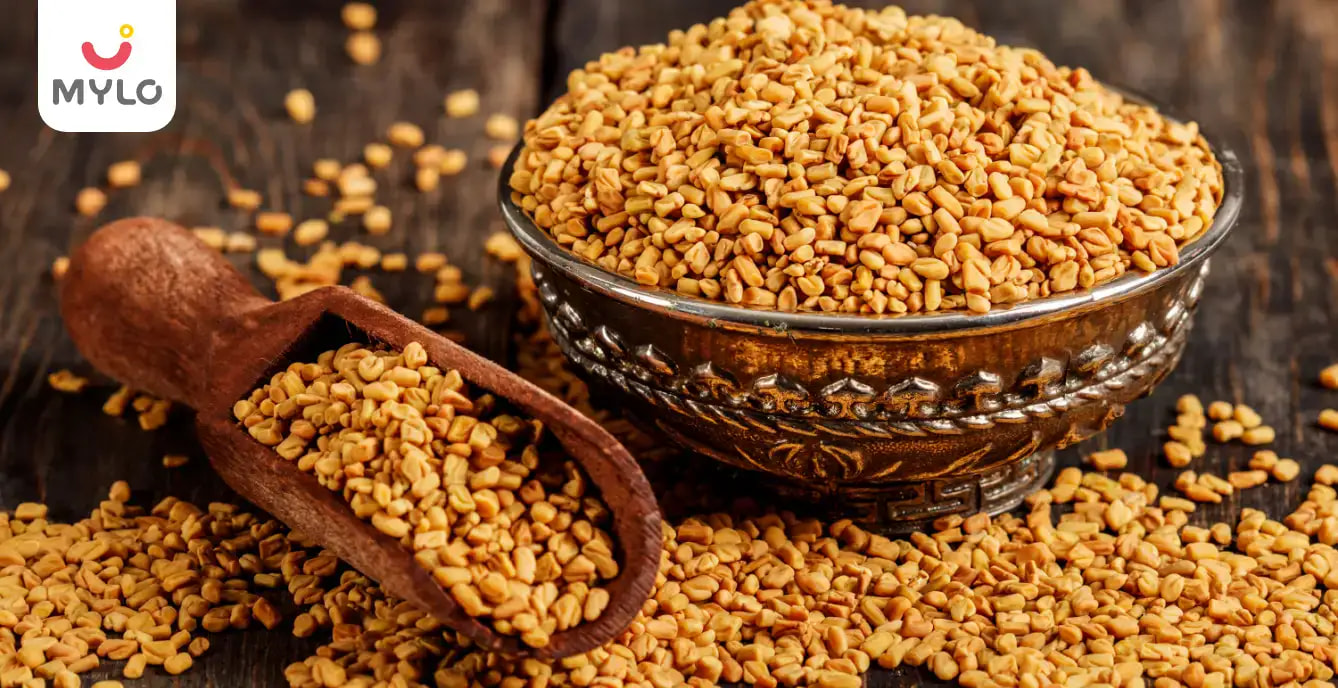
VIEW PRODUCTS
- Home

- Diet & Nutrition

- Fenugreek During Pregnancy: Side Effects & Benefits
In this Article
Diet & Nutrition
Fenugreek During Pregnancy: Side Effects & Benefits
Updated on 3 November 2023
Fenugreek or methi is one such item that many women are cautious of consuming during their pregnancy because since time immemorial it has been said that this should be avoided as it can have side effects and cause problems in one's pregnancy journey. Naturopaths and doctors say that fenugreek is a strong herb that can trigger contractions in a woman's body, which may lead to premature delivery or even abortion.
Here's all you need to know about consuming fenugreek seeds during pregnancy. Wondering if you can have methi paratha during pregnancy or methi leaves during pregnancy? Let's find out.
Is Fenugreek (Methi) Safe to Consume during pregnancy?
Have you ever heard of elders in your home suggesting that you should take fenugreek seeds or eat methi paratha to induce your period? Let's discuss in detail-
1. Causes uterine contractions
Drinking fenugreek water during pregnancy may result in uterine contraction and can cause misscarriage. Generally, consumption of fenugreek in pregnancy is avoided as there are instances of its consumption causing strong contractions, often leading to miscarriages. Many women claim that consuming fenugreek in large quantities can lead to premature births or even abortions.
2. Linked to birth defects
Too much consumption of fenugreek during pregnancy first trimester has also been associated with birth defects in the foetus, neonatal defects, and even congenital malformations.
Fenugreek consumption has also been known to lead to reproductive toxicity and problems in the development of the foetus. For these reasons, the use of fenugreek or methi during pregnancy is generally avoided in large quantities.
You may also like: Fennel Seeds During Pregnancy: Benefits, Risks & Nutritional Value
Side effects of methi in pregnancy
It is generally safe to consume methi in pregnancy only when consumed moderately. Else eating fenugreek during pregnancy can have side effects for pregnant women. These are some of the commonly experienced side effects -
1. Congenital problems
Consuming too much fenugreek or methi leaves during pregnancy can lead to the baby being born with congenital malformations.
2. Uterine contractions
The use of fenugreek can also lead to contractions in the expecting mother's body.
3. Unusual body odour
Many people even claim that the increased consumption of fenugreek during pregnancy first trimester can lead to unusual body odour in the newborn baby.
Benefits of fenugreek seed during pregnancy
Just as the increased use of fenugreek seeds can lead to contractions as a side effect, this can also be beneficial among women who need to induce labour. For ages, fenugreek seeds during pregnancy have been used to help women not just induce labour through contractions, but also to reduce and relieve labour pain. Consuming fenugreek in pregnancy can help women hasten and ease the labour process.
How much fenugreek is safe to consume during pregnancy?
Naturopaths and doctors will suggest that if you are pregnant, then it's best to avoid the consumption of fenugreek. These seeds are used to induce labour and can cause contractions. However, the consumption of fenugreek can also lead to miscarriage and premature labour.
Therefore, women are typically advised against consuming fenugreek in pregnancy to avoid these complications from arising. Nonetheless, a very small quantity consumed very infrequently may be done, so long as a doctor's advice has been taken.
Also read: Sesame Seeds in Pregnancy: Benefits, Effects & Nutritional Value
When should I start taking fenugreek during pregnancy?
Typically, fenugreek seeds during pregnancy are consumed only after the 37th week. This is because fenugreek seeds can induce labour and cause contractions and therefore women are advised against taking it in their initial pregnancy stage.
Fenugreek seeds are also considered to be an excellent agent that increases milk supply among lactating women. So, after the baby is born, women typically consume fenugreek seeds, methi leaves or methi paratha to improve their milk supply.
Can I consume fenugreek tea when expecting?
Generally, it is advised not to consume fenugreek leaves, seeds, or even tea made from fenugreek seeds as this can induce labour among expecting women. Fenugreek has strong herbal properties which can even lead to miscarriages, contractions, or premature labour among women. It is best to avoid not just fenugreek tea during pregnancy but all forms of fenugreek while being pregnant.
Final words
In conclusion, Fenugreek has benefits and potential side effects during pregnancy. While it has been traditionally used to promote labor and uterine contractions, it is best advised that Fenugreek during pregnancy should be avoided till the 37th week. Therefore, it can be said that not all beneficial seeds should be consumed during pregnancy; the best practice is to consult your doctor before adding anything to your diet.
By making informed decisions and seeking guidance from healthcare providers, expectant mothers can navigate the use of Fenugreek leaves during pregnancy in a way that aligns with their individual needs and ensures a healthy and positive pregnancy experience.
References
1. Khalki, L., Ba M’hamed, S., Sokar, Z., Bennis, M., Vinay, L., Bras, H., & Viemari, J.-C. (2013). Prenatal Exposure to Fenugreek Impairs Sensorimotor Development and the Operation of Spinal Cord Networks in Mice. PLoS ONE, 8(11), e80013.
2. Khalki, L., Bennis, M., Sokar, Z., & Ba-M’hamed, S. (2012). The developmental neurobehavioral effects of fenugreek seeds on prenatally exposed mice. Journal of Ethnopharmacology, 139(2), 672–677.



Written by
Sanju Rathi
Get baby's diet chart, and growth tips

Related Articles
Related Questions
Influenza and boostrix injection kisiko laga hai kya 8 month pregnancy me and q lagta hai ye plz reply me

Hai.... My last period was in feb 24. I tested in 40 th day morning 3:30 .. That is faint line .. I conculed mylo thz app also.... And I asked tha dr wait for 3 to 5 days ... Im also waiting ... Then I test today 4:15 test is sooooo faint ... And I feel in ma body no pregnancy symptoms. What can I do .

Baby kicks KB Marta hai Plz tell mi

PCOD kya hota hai

How to detect pcos

Related Topics
Products you may like
RECENTLY PUBLISHED ARTICLES
our most recent articles

Diet & Nutrition
গর্ভাবস্থায় আলুবোখরা: উপকারিতা ও ঝুঁকি | Prunes During Pregnancy: Benefits & Risks in Bengali

Diet & Nutrition
গর্ভাবস্থায় হিং | ঝুঁকি, সুবিধা এবং অন্যান্য চিকিৎসা | Hing During Pregnancy | Risks, Benefits & Other Treatments in Bengali

Women Specific Issues
স্তনের উপর সাদা দাগ: লক্ষণ, কারণ এবং চিকিৎসা | White Spots on Nipple: Causes, Symptoms, and Treatments in Bengali

Diet & Nutrition
গর্ভাবস্থায় পোহা: উপকারিতা, ধরণ এবং রেসিপি | Poha During Pregnancy: Benefits, Types & Recipes in Bengali

Diet & Nutrition
গর্ভাবস্থায় মাছ: উপকারিতা এবং ঝুঁকি | Fish In Pregnancy: Benefits and Risks in Bengali

Diet & Nutrition
গর্ভাবস্থায় রেড ওয়াইন: পার্শ্ব প্রতিক্রিয়া এবং নির্দেশিকা | Red Wine During Pregnancy: Side Effects & Guidelines in Bengali
- ইনার থাই চ্যাফিং: কারণ, উপসর্গ এবং চিকিৎসা | Inner Thigh Chafing: Causes, Symptoms & Treatment in Bengali
- গর্ভাবস্থায় ব্রাউন রাইস: উপকারিতা ও সতর্কতা | Brown Rice During Pregnancy: Benefits & Precautions in Bengali
- Velamentous Cord Insertion - Precautions, Results & Safety
- Unlock the Secret to Flawless Skin: 7 Must-Have Qualities in a Face Serum
- Unlock the Secret to Radiant Skin: How Vitamin C Serum Can Transform Your Complexion
- Gender No Bar: 10 Reasons Why Everyone Needs a Body Lotion
- Unlock the Secret to Radiant Skin How to Choose the Perfect Body Lotion for Your Skin Type
- Top 10 Reasons to Apply a Body Lotion After Every Bath
- Communication in Toddlers: Milestones & Activities
- How to Improve Vocabulary for Toddlers?
- A Comprehensive Guide to Understanding Placenta Accreta
- Vulvovaginitis in Toddlers Causes, Symptoms and Treatment
- A Comprehensive Guide to Understanding Cerebral Palsy in Children
- Bitter Taste in Mouth During Pregnancy: Understanding the Causes and Remedies

At Mylo, we help young parents raise happy and healthy families with our innovative new-age solutions:
- Mylo Care: Effective and science-backed personal care and wellness solutions for a joyful you.
- Mylo Baby: Science-backed, gentle and effective personal care & hygiene range for your little one.
- Mylo Community: Trusted and empathetic community of 10mn+ parents and experts.
Product Categories
baby carrier | baby soap | baby wipes | stretch marks cream | baby cream | baby shampoo | baby massage oil | baby hair oil | stretch marks oil | baby body wash | baby powder | baby lotion | diaper rash cream |








